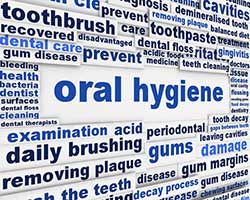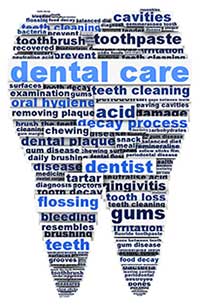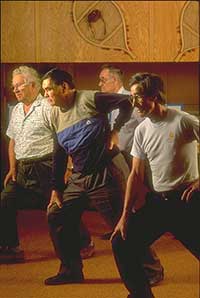Completion requirements
View
Topic Overview

- More seniors have their own teeth
- A healthy mouth is important to general health
- Good daily mouth care can prevent oral diseases.
- An unhealthy mouth can be painful. Mouth pain can affect your ability to chew, eat, and to speak.
- An unhealthy mouth can smell bad. You may decrease your time spent with others when you have bad breath.
- An unhealthy mouth may put you at risk for heart disease and aspiration pneumonia.
- When your immune system is low, your mouth may develop fungal infections or other infections in the mouth.
What You Should Know
- Cavities
- Older adults get cavities around old fillings
- Older adults get cavities on root surfaces
- Gum disease
- Your teeth need to be brushed two times every day.
- Your gums are not healthy if they bleed.
 Oral Cancer
Oral Cancer
- Older adults have increased chance of getting oral cancer
- Cancer in your mouth may be on your tongue, lips, throat, inside your cheeks, roof of your mouth or the floor of your mouth.
- Dry mouth
- Very common for older adults
- Many medications make your mouth dry. Over 400 medications may cause dry mouth.
- Dry mouth increases bacteria growth and it sticks better to the teeth
- Bacteria is harder to brush off when teeth are dry.
- Mouth is often dry if you have diabetes, or Parkinson’s disease, or Rheumatoid Arthritis.
- Teeth
- If you have teeth, they need to be brushed two times per day
- Use toothpaste with fluoride
- Use floss if you can. Floss picks can be easier to use.
- Dentures
- You should take them out of your mouth and brush them two times per day.
- Dentures should be taken out of your mouth each day for a few hours.
- Soak dentures in water when you take them out.
- Make sure your name is on your dentures.
 Mouthwash
Mouthwash
- Use mouthwashes without alcohol
- Use a mouthwash with fluoride to help make teeth and roots stronger (Recommend CREST ProHealth rinse OR ORAL B fluoride rinse)
- Biotene mouth rinse may help with your dry mouth http://www.biotene.com/
- Lip Care
- To avoid lips from cracking, use lip products such as Labello® or Blistex®
- Vaseline is not effective and should not be used
- Dry Mouth
- Drink or sip as much water as possible
- Sucking on small ice chips can be soothing
- Rinse with Canada Dry® Club Soda
- Use sugar-free candies or gum
- Recommend using a humidifier in your room
- Products can be bought at a local pharmacy that help to moisten your mouth. One of these products is called Biotene Oral Balance® http://www.biotene.com/. Use mouth rinse or mouth spray
- Foods, Drinks, Candies
- Eating healthy foods will help keep your mouth healthy.
- If possible, eat as many crunchy foods as you can. Crunchy foods do not stick to the teeth. Soft foods stick to the teeth.
- Large amounts of fruit juice, ice tea and pop are not good for the teeth.
- If you have candy, try the sugar-free types. Regular hard candy has lots of sugar.
When to Seek Advice
You should seek advice from a dentist, dental hygienist or denturist
- If your mouth is bleeding (dentist or dental hygienist)
- If you have sores in your mouth (dentist or dental hygienist)
- If you have pain in your mouth (dentist or dental hygienist)
- If you have any swelling in your mouth (dentist or dental hygienist)
- If you feel any lumps in your lips, cheeks, or tongue
- If your dentures are broken (dentist or denturist)
- If your teeth are loose or broken (dentist)
Last modified: Wednesday, 27 April 2022, 9:28 AM